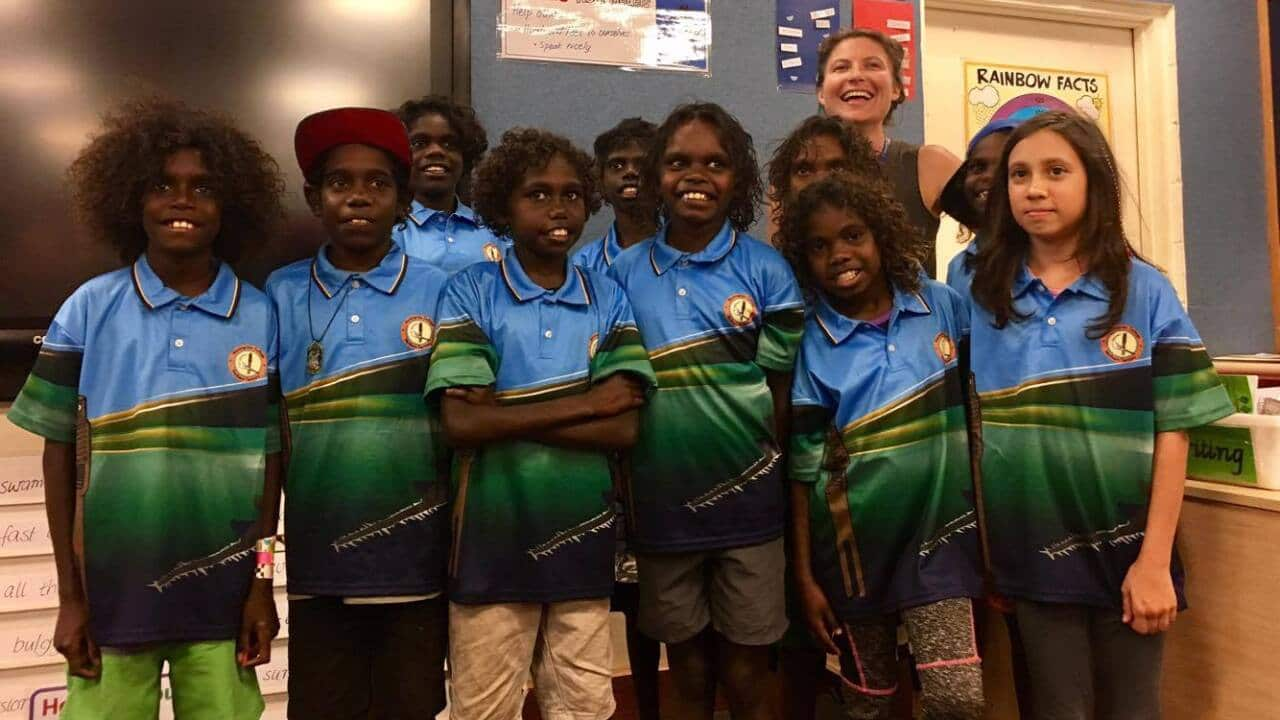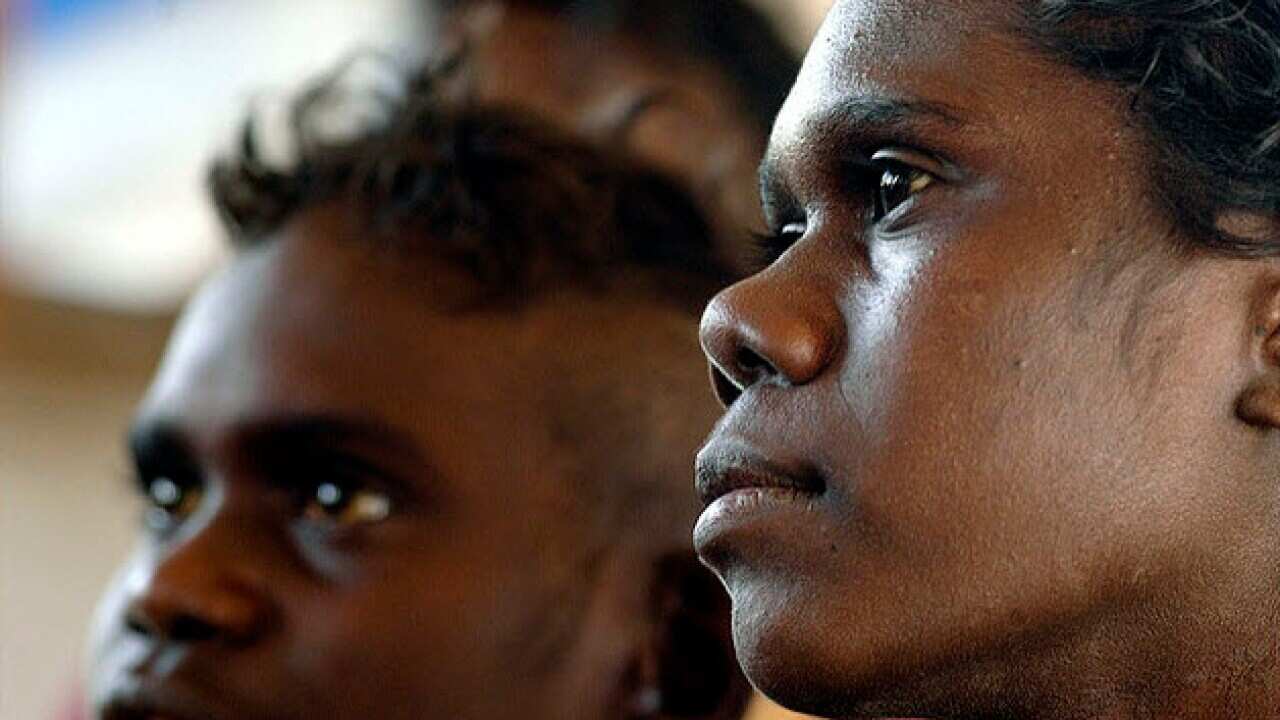It’s almost 3pm on a Monday afternoon and the students at Maningrida College are sitting outside their classroom under the shade of a large tree. They are listening intently to their Elders, who are halfway through their ‘Learning On Country’ class.
“They learn about the land, the whole environment, bush medicine and the other things,” Lurra Language and Culture Teacher Cindy Jinmarabynana explains.
For Cindy, her role is paramount to ensure the continuity of culture.
“I am a qualified teacher and I need to teach in the class as an Aboriginal teacher, so the students will know [me] as a family and as a teacher, and learning about their own language.” There are a number of different clan groups and language groups in the Arnhem Land community of Maningrida. The inclusion of these languages in the school’s curriculum is helping the students thrive.
There are a number of different clan groups and language groups in the Arnhem Land community of Maningrida. The inclusion of these languages in the school’s curriculum is helping the students thrive.

Lurra Language and Culture teachers Cindy Jinmarabynana and Mason Scholes. Source: NITV, Elliana Lawford
“The main language is Ndjebbana, and the second language is Burarra, but we’ve got other formal languages as well as Kunwinjku, Rembarrnga and Wulaki, and Djinang,” Cindy says.
Cindy’s colleague, Mason Scholes, adds: “with our Indigenous Language and Culture Unit that we run here at the college we teach five languages across the school, from preschool right up to the senior years. And we go on camps throughout the year with our five language groups.”
But for new teachers, the complexities of the culture, language and kinship system can be a challenge.
“When you come to a new community it's obviously a very foreign new place, so it's really difficult to just pick out someone to ask questions you might have,” newly-arrived teacher, Anastasia Hancock, explains. The challenges that come with being posted in a remote community can be the ultimate test for new teachers. Research suggests that as many as 50 per cent leave the profession within the first five years. So the mob in Maningrida have developed a new cultural induction program to make the transition easier.
The challenges that come with being posted in a remote community can be the ultimate test for new teachers. Research suggests that as many as 50 per cent leave the profession within the first five years. So the mob in Maningrida have developed a new cultural induction program to make the transition easier.

Anastasia Hancock is a new teacher at Maningrida College. Source: NITV, Elliana Lawford
“We help the new teachers to know about the community, to know about the school, how the school works with Aboriginal Assistant Teachers, to know about our community background, the land, the Traditional Owners of this land. They'll know about how we share the ceremonies and teaching both ways in our school,” Cindy Jinmarabynana explains. The program is yielding positive results.
The program is yielding positive results.

Cindy Jinmarabynana and other Maningrida elders give a cultural induction class to newly arrived teachers. Source: NITV, Elliana Lawford
“Having the induction process really helps you get a bigger picture of the whole context, understand what [sacred] places you might be allowed or not allowed to go to,” Anastasia says.
“You get to learn all about the kinship rules, you get to learn what your sort of language name would be, and therefore, your relationship to others in your classroom and [the] wider community.
“You feel more included, and by feeling more included, it's not just come to work and go home, and you don't know anything about the place you're in. You feel like you're a part of the community, so you grow much more attached to the place, to the school, to the people that you're working with.” New teachers are also encouraged to learn the local languages.
New teachers are also encouraged to learn the local languages.

Cindy Jinmarabynana runs through the many languages spoken in Maningrida. Source: NITV, Elliana Lawford
“We have a language and culture committee that also runs introduction lessons for various community members to attend. We set up language subjects and units that are open to [the] community,” Mason says.
“Having taught here for quite a number of years, I've seen quite a number of teachers come and go, but since we've introduced the cultural introduction, it's helped teachers stay in [the] community a lot longer, due to them developing stronger relationships with community and their students.” The Northern Territory government is also focusing on retaining remote teachers and has commended the program.
The Northern Territory government is also focusing on retaining remote teachers and has commended the program.

The cultural induction program is receiving positive feedback. Source: NITV, Elliana Lawford
“Each school is different, the local context is different, the languages differentiate, the culture and the social impacts also differentiate across the different communities we have, so having a localised cultural aspect to orientation, I think is extremely important,” Member for Arnhem Land and former teacher, Selena Uibo, says.
“Even if you move from a school like Maningrida to a school like Ramingining, even though they’re very close, they might operate very differently socially, culturally, and with their language, so having that social and contextual focus for the orientation for teachers I think is very valuable.”
“And I think remote communities in particular really benefit from having consistent teachers in the school, consistent leadership, so building relationships is extremely important for these communities.” The NT government recently launched an online teacher induction and mentoring program, aimed at keeping teachers in the Northern Territory.
The NT government recently launched an online teacher induction and mentoring program, aimed at keeping teachers in the Northern Territory.

Member for Arnhem Land Selena Uibo and Education Minister Eva Lawler at Maningrida School. Source: NITV, Elliana Lawford
NT Education Minister, Eva Lawler, explains the hope is for “experienced teachers being able to mentor and support teachers that are new to the Territory”.
“So it’s on many levels - if you’re a teacher that’s new to the Territory you may want assistance and ideas around classroom management, or planning, or programming, or working in a cross-cultural setting… so you have a mentor and a mentee who hopefully develop a trusting relationship, [the mentor] is not their boss, it’s their buddy and their peer that can support them.”


It's all smiles in Anastasia Hancock's classroom. Source: NITV, Elliana Lawford

Source: NITV, Elliana Lawford






